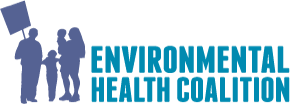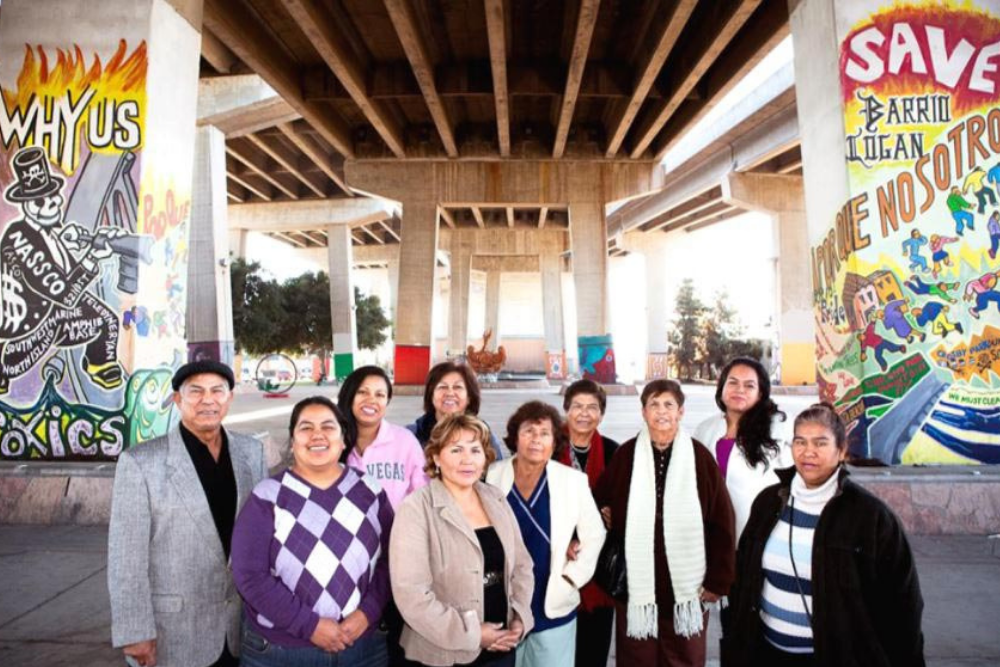Welcome to Environmental Health Coalition’s SALTA Community Leadership Training Program.
This page has everything you need to learn about SALTA, create a registration account to download the curriculum and log in to return for more downloads and to provide feedback.
What Is SALTA?
SALTA (Salud Ambiental Lideres Tomando Accion – Environmental Health, Leaders Taking Action) is a web-based, interactive leadership development curriculum that provides community leaders with skill-building training in community organizing, policy advocacy, building power, community health, environmental justice and effective communication.
What Is The SALTA Approach?
SALTA programs represent the organic educational efforts of the different campaigns, teams, leaders, and staff that make up EHC and were designed specifically for our leaders based on our local efforts. We began SALTA trainings in 1996, and now more than 2,000 individuals have been trained.
Developed and field-tested by EHC staff and leaders during the past 15 years, SALTA uses a popular education approach that makes the training inclusive and accessible to all participants. Trainings are based on the knowledge, skills, and real-world experiences of EHC staff, leaders, and training participants.
Popular education, which has varying interpretations, is best defined by the practice where participants share their own understanding and feelings about a specific topic or issue and that understanding and feelings are considered valid. The idea of popular education (often described as “education for critical consciousness”) as a teaching methodology came from a Brazilian educator and writer named Paulo Freire, who was writing in the context of literacy education for poor and politically disempowered people in his country. It’s different from formal education (in schools, for example) and informal education (learning by living) in that it is a process that aims to empower people who feel marginalized socially and politically to take control of their own learning and to effect social change.
The SALTA sessions improve participants’ sense of belonging to a community as participants and stakeholders of their societies. They begin to see themselves as empowered members who can make change.
How Can My Organization use SALTA?
The main objectives of SALTA are:
- To develop unity, commitment and shared consciousness on core principles
- To enhance leader’s skills and effectiveness
- To develop an understanding of all efforts
If these objectives are consistent with your organization’s mission and theory of change, SALTA can provide a forum for learning and growing. SALTA training works best when integrated with active campaigns and opportunities to use the skills in the real world.
Each session builds on the prior one. You may use individual activities or sessions as stand alone workshops but be aware that there may be topics covered in prior sessions that are integral to full understanding.
You will find it necessary in some cases to change or adapt some of the information or activities to suit your purposes, communities and local efforts. EHC encourages adaptation for individual needs of non-profits, environmental and social justice organizations, unions and public schools however any for-profit enterprise must first get permission directly from EHC.
Millions of dollars in grant funding is available at the local, state and federal level for climate equity projects. EHC is working to identify and retain climate investments for environmental justice communities in partnership with other agencies and organizations. One example is the Transformative Climate Communities program through the Strategic Growth Council.
Download SALTA Curriculum
Session 1: Leadership
Social change relies on the leadership of people who understand the urgency of addressing injustice and who decide to act to improve their life conditions. In the Leadership Session, participants explore the concept of leadership within communities affected by social and environmental injustice, and their roles and responsibilities as EHC leaders. Participants will begin to recognize their position as an EHC Leader and to identify themselves as such. EHC’s overall ideology is introduced, along with the general goals for the Leader SALTA training.
Session 2: Environmental and Social Justice
The Environmental Justice movement grew from hundreds of local struggles by taking a civil rights and social justice approach to environmental health protection. This session defines environmental justice and environmental racism (environmental injustice). It provides an opportunity for EHC leaders to identify environmental racism in their neighborhoods. It demonstrates the effectiveness of local organizing to achieve environmental justice.
Session 3: Environmental Health I
Environmental Justice is the right of all people to work, live, and play in a healthy and safe environment. Environmental Health makes the link between pollution in the environment and human health. This session focuses on how toxic pollution denies this right to many, especially to workers and people living in low-income communities of color. Participants will learn how EHC leaders have taken actions and promoted policies to protect communities. Participants learn the basics of environmental health and the basics of childhood lead poisoning prevention.
Session 4: Environmental Health II
Air Toxics are substances known to have adverse effects on human health and the environment. In this session participants will learn about the sources and health impacts of Air Toxics affecting EHC’s communities. Participants will also learn about EHC’s current efforts to combat community air toxics through community driven land use and sustainable energy campaigns, and see how EHC’s goal for prevention (pollution prevention, the precautionary principal and cumulative impacts) guide our work in these areas.
Session 5: Power
This session will cover the role of power in winning environmental and social justice for environmental justice communities, how to assess an existing power structure and how to gain enough power to win. The first step of EHC’s Process for Action (analyze) will be introduced and the use of EHC’s power mapping tool in this process will be demonstrated.
Session 6: Messaging for Social Change
Persuading individuals and organizations to support EHC’s goals and objectives and to take action requires effective messaging. In this session, EHC Leaders will learn the basics of message development and how their personal stories can be used to inspire trust and hope in the target audience and create the will to take action. The framework for this session flows from EHC’s Power Analysis. Certain activities and concepts are adapted from The Spitfire Strategies’ Smart Chart 3.0 and the work of Marshall Ganz’ Camp Obama trainings.
Session 7: Organizing
Community organizing is a value-based strategy which empowers people to take action to win real improvements for the benefit of their communities and the common good. The foundation of community organizing is relationship building. In this session participants learn how to develop a relationship as a representative of EHC by sharing stories and broaden the “My Story” developed in the last session to “Our Story.” EHC’s organizing model and some of the organizing tactics are introduced.
Session 8: Advocacy
Advocacy is the process of influencing public policy and the distribution of public resources. For EHC the purpose of advocacy is to influence policy makers to take actions to protect public health and the environment. EHC is proactive in developing public policy solutions, participating in setting the agenda and framing the issue. Solutions are based on our beliefs and values and are developed through the Process for Action. EHC Leaders have specific advocacy responsibilities, authority, and personal characteristics that help them become strong advocates.
Session 9: Land Use Advocacy and Leadership II
This last SALTA session will serve as a comprehensive review of all previous sessions by combining learnings through several activities. Participants will develop a vision for a model community and then prepare a presentation advocating for the new vision before an elected official. The presentation will incorporate the Problem/Solution/Action and personal story telling framework from prior sessions. Participants will sign a Leadership Commitment pledge.


